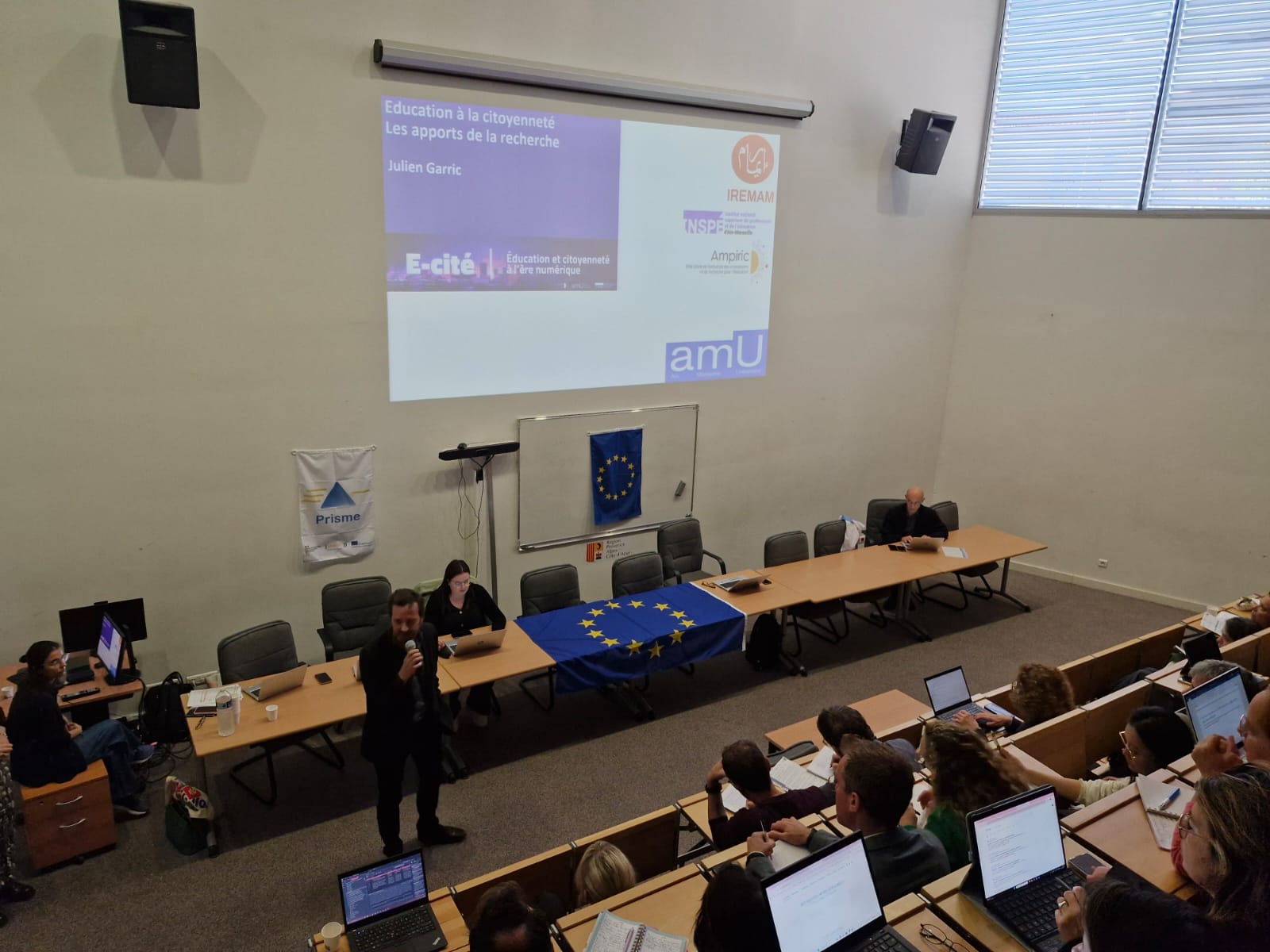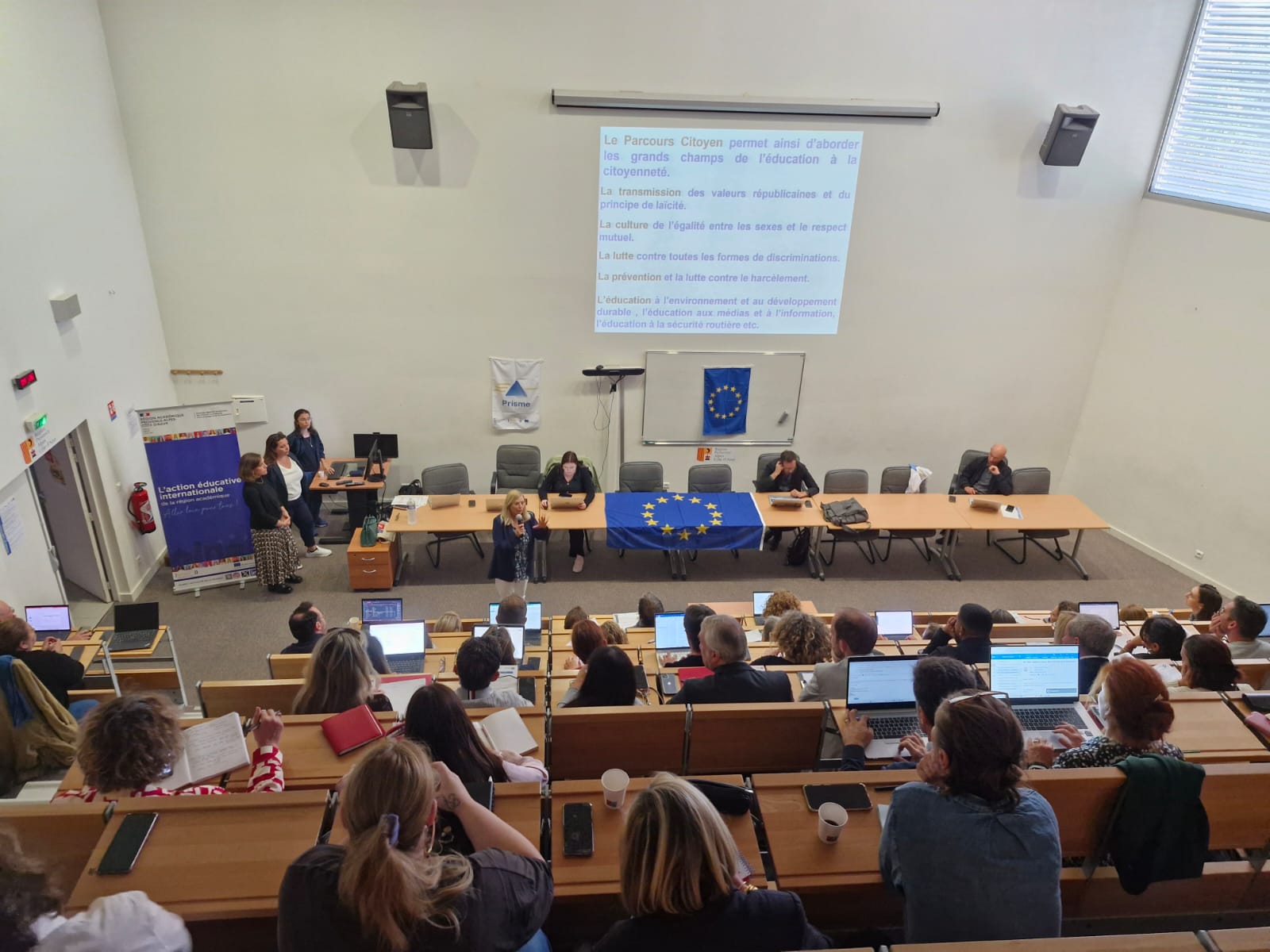Prisme 7
Edition 2025/2026

Citizenship education and student involvement in their school and personal environment
Encouraging young middle and high school students to develop a sense of civic awareness and a desire to contribute through their actions—particularly by getting involved in their schools and/or in local community organizations—is a priority shared by several European countries.
In France, there are numerous initiatives such as the Citizenship Pathway, the “Engaged Classes” Label, and Engagement Weeks. Whether addressing issues like bullying prevention, gender equality, sustainable development, or student participation in school life, citizenship education takes many forms and contributes to improving the overall school climate.
In partnership with the student life departments of the Aix-Marseille and Nice education authorities, the 2025/2026 edition of Prisme 7 will focus on the following theme:
Citizenship education and student engagement within their school and personal environments – a European comparison
To best prepare participants for their mobility experience, a reflection on the challenges and issues related to citizenship education at academic, national, and European levels was offered during the launch seminar held at Lycée Janetti in Saint-Maximin in October 2025. A selection of useful resources can be found below:


La construction à l’école d’une identité de citoyen : obstacles et condition
Du rôle de l’éducation dans la construction d’une citoyenneté de l’action
L’éducation à la citoyenneté : concepts et débats depuis le XVIIIe siècle
L’éducation à la citoyenneté : Enjeux, acteurs, contextes
Parcours citoyen d’élèves 1er degré en France et dans la Région académique PACA
Parcours citoyen d’élèves 2nd degré en France et dans la Région académique PACA
Prisme 6
Edition 2024/2025

The inclusion of refugee and migrant pupils in education systems: a European integration issue
More than ever, all European countries are faced with a large influx of young migrants and refugees, sometimes with little or no previous schooling in their countries of origin, fleeing conflicts and/or facing difficult social situations that school systems need to address. In partnership with the CASNAVs of Aix-Marseille and Nice, the academic centers for the education of newly-arrived allophone pupils and children from itinerant and traveler families, the Prisme 6 2024/2025 edition focuses on “The inclusion of refugee and migrant pupils in education systems: a European integration challenge”.
What role does this play in other European Union countries? How does it fit into students’ educational careers? What challenges does it face?
To better prepare participants for their mobility, a reflection on the challenges of including refugee and migrant students in European education systems was proposed during the launch seminar at the Lycée Saint-Charles in Marseille in October 2024. Some interesting resources can be consulted below:
Rapport Eurydice – L’intégration des élèves issus de l’immigration
Rapport DREIC – L’inclusion scolaire des élèves migrants en UE
Dossier de synthèse CNESCO – Les inégalités sociales et migratoires à l’école
Accueillir des élèves migrants dans des écoles européennes : réalités et enjeux – Sarah Degée
The Persistance of Marginalisation – Virginie Baby-Collin et Luna Russo
Prisme 7
Prisme 6
Prisme 5
Prisme 4
Prisme 5
Edition 2023/2024

Digital technology, a key to academic success for tomorrow’s enlightened actors
Each year, the Erasmus+ Prisme mobility program focuses on a specific theme. More than ever, digital technology is becoming an increasingly essential dimension of education, and the European Union has adopted a Digital Education Action Plan (2021-2027). In partnership with DRANE (Direction régionale académique au numérique éducatif), the 2023/2024 edition of Prisme 5 focuses on :
What role does it play in other European Union countries? How does it fit in with educational practices and student career paths? What challenges does it face?
To help participants prepare for their mobility, the launch seminar at the Collège Sophie Germain de Luynes in October 2023 included a discussion of digital issues at academic, national and European levels. Some interesting resources can be consulted below: :
FR – Rapport Eurydice sur l’Éducation numérique à l’école en Europe
Le numérique éducatif : un portrait européen
Plan d’action en matière d’éducation numérique 2021-2027
Soutien de l’UE à la numérisation des écoles – Un rapport de 2023
Prisme 4
Edition 2022/2023

Physical and sports education as a school subject in other European countries
The Erasmus+ Prisme mobility program focuses on a specific theme each year. In anticipation of the 2024 Olympic Games and to initiate a cooperative dynamic with regional “youth and sport” directorates, the 2022/2023 Prisme 4 edition concerns the challenges of physical and sports education as a school discipline in other European countries.
What role does it play in other EU countries? How does it fit into students’ learning paths? What meaning does it have?
To better prepare participants for their mobility, a presentation of PE teaching in European Union countries and in France was given at the launch seminar at the Lycée Paul Cézanne in Aix-en-Provence in October 2022. The proceedings can be downloaded below:

Présentation de l’Inspecteur général Jean-Marc Serfaty sur les enjeux de l’enseignement du sport en Europe
Présentation des IA/IPR Gwladys Vasseur et Benjamin Fanjaud sur les enjeux de l’enseignement de l’EPS en France
Other interesting resources :
